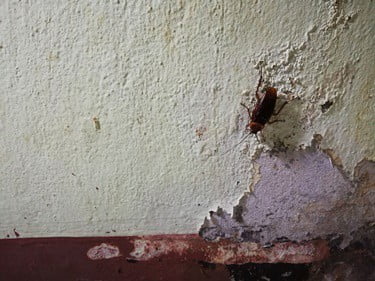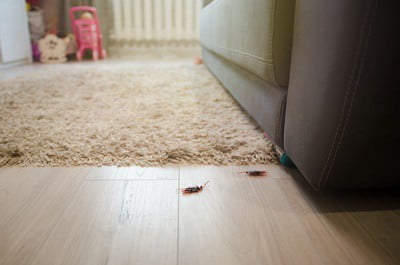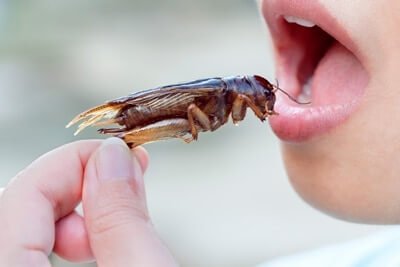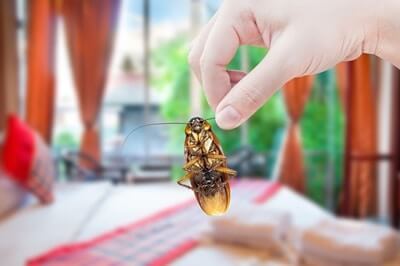There are many myths about how to deter cockroaches with scents. When humans and animals dislike the smell of something, they tend to avoid it completely. Surely, if you could figure out the different smells that cockroaches dislike or even hate, you could put them in their favorite hiding places. That would keep roaches away.
Roaches are deterred by scents that humans enjoy, such as citrus. For kitchen deterrents, cockroaches dislike the smell of cinnamon, bay leaves, garlic, peppermint, and coffee grounds. If you want a strong-smelling disinfectant, choose vinegar or bleach. The best scent-based deterrents are essential oils, such as eucalyptus or tea tree oil.
However, it depends on how you apply scent-based cockroach repellents. They can be sprinkled, sprayed, diffused, or smeared in no-go areas. Unfortunately, cockroaches are skilled at adapting to their surroundings. No matter which scents you use, hungry cockroaches may choose to ignore these strong odors in the pursuit of food.
Can Scents Keep Roaches Away?
Scents can keep roaches away. However, there is little evidence surrounding which scents roaches hate.
People mostly rely on anecdotal evidence or myths passed along by others. Narrowing it down is made harder because cockroaches are mostly able to overcome smells they dislike because they’re so resilient.
Roaches Have A Good Sense of Smell
According to the Journal of Experimental Biology, roaches have a strong sense of smell. Here, researchers observed how American cockroaches tracked odors.
Cockroaches don’t have a nose. They use antennae to detect chemicals in the air. Roaches can still track down the source of an odor with just one antenna.
Roaches May Ignore Smells
Not all odors will register in cockroaches the same way they register in humans.
You may find that roaches avoid spots that smell strongly of bleach. If you bleach areas to deter cockroaches, this may work for a time. However, roaches may return because they no longer care about the scent.
Cockroaches are resilient and able to learn and adapt to their surroundings with their limited intelligence. If they smell an offensive odor, they might ignore the space to be safe. If they’re sufficiently hungry, though, cockroaches may revisit the place to see if it’s something they can overcome so that they can eat.

Death Smell
Roaches have a strong reaction to smells given off by other cockroaches. The most prominent among them is the death scent. This is emitted by cockroaches when they die, serving as a chemical warning to nearby roaches.
Roaches have been shown to flee areas where the death scent is emitted. However, if hungry enough, a roach may overcome this fear to feed on the carcass.
A bad smell may be enough to give roaches pause for thought. They may even stay away from the area for a period of time. However, when there’s tempting food on the other side of the smell, cockroaches may overcome their distaste and pursue the food regardless.
This means essential oils and bleach deterrents are not a permanent solution. It makes the area inhospitable to cockroaches, but roaches are adept at thriving in unfavorable environments.
What Natural Scent Keeps Roaches Away?
The scents below are not guaranteed to kill roaches. However, they make up for this with other advantages:
- Easy to find. You might find lavender and bay leaves in your local grocery store.
- Safe to use. They aren’t harmful when aerated and inhaled in small amounts, unlike poison-based roach sprays.
- Easy to apply. You don’t need to section off your home or wear a mask when using natural scents. You can pour these in a bowl or smear them in an area without danger.
- Pleasant smell. Unlike roach poison, you won’t make your home smell of chemicals.
Some scents are unsafe around animals, most notably birds, due to their delicate respiratory systems.
Bay Leaves
Bay leaves have long been used as a repellent against cockroaches. Aside from being inexpensive, this ingredient is a staple in many kitchens. If you’re not 100% sure about the type of pest you’re combating, then it’s easy to use bay leaves as a catch-all. They’re moderately effectively against:
- Flies
- Mice
- Moths
- Earwigs
- Roaches
Bay leaves have a pungent odor. If you get the leaves dried or in powder form, they will have a flowery smell that’s comparable to oregano. To use them against pests, you can crush the leaves and then:
- Sprinkle them in areas where you want to deter pests
- Smear them on clothing or fabric, as they won’t stain and can be washed off
- Place them in small bowls in areas you want to keep protected
Freshly crushed leaves will have the strongest smell. Sprinkling the powder or placing the leaves uncrushed in areas may be less effective. You can also grow the plants to provide a constant deterrent, but the smell will be less pungent. Good locations to place bay leaves include:
- Kitchen counters
- Kitchen entrances
- Pantries
Cinnamon
Roaches have been shown to steer clear of cinnamon because of its texture, not the smell. When roaches walk through the dust or crawl across the sticks, they’re bothered by the coarse surface. However, there are no official studies.
To use cinnamon, sprinkle ground cinnamon on surfaces that roaches visit. Commercial cinnamon brands often have additions, such as sugar. This can actually attract roaches, who will seek out gluten for nutrients.
Cinnamon can blow away and will lose its strong smell over time. You’ll need to reapply the cinnamon frequently.
Garlic
Garlic has a pungent aroma that continues to remain strong. To use garlic against roaches, you can:
- Sprinkle garlic powder in corners where the roaches frequent
- Place whole cloves at key spots around your kitchen
- Crush a whole clove and smear the chunks on certain areas
If the cloves are left in the kitchen long-term, the smell will eventually fade. The clove will also begin to rot, which changes the odor completely. This may attract other pests to come and eat the garlic, so switch out cloves every 1-2 weeks to prevent that from happening.
Coffee Grounds
Due to the coarse texture and strong smell, coffee grounds are believed to drive away roaches. Coffee grounds shouldn’t be mistaken for instant coffee. This only works with ground-up coffee beans. The fresher, the better.
To use coffee grounds, spread them in areas where you commonly find roaches. Clean them up and refresh them with new grounds once per week. The smell will begin to fade otherwise. If your roaches can’t find enough food elsewhere in the house, they may feel compelled to eat the grounds, so use this option sparingly.
Citrus
Roaches are believed to be averse to the smell of citrus. That’s true whether it’s fresh oranges or lemons or an artificial version mixed into bug spray. You can use:
- Scented bug spray, which is the most effective method as it’s mixed with real poison. On contact, this will kill roaches. Any survivors that smell the citrus, and the death stench, should be driven away.
- Fresh fruit, be it oranges, lemons, or another kind of citrus fruit.
- Citrus juice
For fresh citrus fruits, cut them open and place them in areas with lots of roaches. Just be sure to replace these often, as ants or flies will gather. Once the citrus fruit begins to rot, throw it out.
As for the juice, place it in a bowl to deter roaches. Just be sure that this is fresh juice made at home. Many store-bought kinds will have added sugar, which can attract more roaches.
Eucalyptus
Eucalyptus has long been used as a deterrent against:
- Insects and pests
- Mold
- Fungi
The smell is potent and lasts for a long time. For the smell to drive off roaches, you need only to:
- Obtain eucalyptus leaves
- Crush them
- Spread the leaves in areas where you find roaches
Fresh and dried leaves can be used. Dried ones will be the easiest to crush into powder, which can be:
- Put in corners
- Spread on molding
- Rubbed over fabric
For the strongest scent, use fresh leaves that have been crushed up.

Essential Oils
If you find natural deterrents fade too quickly or you dislike leaving raw ingredients around your kitchen, you can turn to essential oils. As the name implies, essential oils only have the ‘essentials’ of a plant, distilled down into a highly concentrated form. This makes the smells powerful, long-lasting, and easy to reapply.
In a study published in the Journal of Anthropod-Borne Diseases, scientists determined that essential oils were reasonably effective against roach nymphs. They provided a safer, more natural alternative to pesticides. In small dosages, these essential oils led to a 100% mortality rate in cockroaches:
- Oregano
- Rosemary
- Yarrow
- Mint
- Eucalyptus
Not only is the smell unpleasant, but the oil-based nature makes it dangerous to roaches on contact. Roaches cannot consume an essential oil. When smeared with the substance, it causes breathing difficulties that suffocate roaches.
Roach-Repelling Essential Oils
Here are some of the most common essential oils used to deter roaches from the home:
Lavender Oil
Lavender essential oil is one of the most accessible scents. When tested against other bugs, such as flies and gnats, lavender was highly effective. However, it shows only moderate results against cockroaches.
To improve its success rate as a cockroach repellent, it’s advised that you mix lavender with other oils. According to Biopesticides International, lavender oil can be effective if mixed with:
- Citronella
- Lemon
- Rose
- Basil oils
This can be spread throughout your home in these ways:
- Made airborne via a diffuser
- Placed in bowls at key areas
- Smeared along the edges of your counters or at spots along the floor
Since it’s an oil, this can be messy. The oily nature will help keep roaches off those surfaces.
Tea Tree Oil
Used in holistic medicine for years, tea tree oil has a potent smell. Roaches have been noted to flee from areas where it’s placed. To use tea tree oil against roaches, combine it with vinegar and water. Mix:
- 1-part vinegar
- 4 parts of water
- 2 drops of essential oil
Place this in a spray bottle. You can spritz the concoction in areas around your kitchen, living room, or bathroom. Since it’s diluted, it will not be as smelly like diffused tea tree oil. However, it’s less likely to stain, and you’re better able to spray a roach directly if you encounter one.
Eucalyptus Oil
The eucalyptus plant has been used as an insect repellent. To use this essential oil against roaches, mix a few drops with water. This can be poured into a spray bottle and then distributed across spots that roaches frequent.
You can also diffuse it into the air to cast a wider net of protection. However, roaches may be able to ignore the smell in the air. Since they’re tactile creatures, touching spots that have been smeared with the oil will be more effective.
Peppermint Oil
Peppermint oil, along with other oils in the mint family, has been proven effective against cockroaches. This can be purchased at your local grocery store as:
- Peppermint extract for cooking
- Peppermint essential oil for fragrance
Both are powerful deterrents for bugs. Mint concentrate is pungent and can burn the skin if left on contact for a short time. Roaches will not only be driven away but later died due to the peppermint. Here’s how to use it:
- Blend mint oils with water and spray on surfaces to repel roaches.
- If you want to set roach traps, soak cotton balls in peppermint oil and place them around your kitchen.
- To create the strongest solution, mix a few drops of oil with 1-part vinegar and 2 parts water.
This will create a pleasant-smelling aroma for your home while damaging roaches on contact.
Citronella Oil
Citronella is touted as the best natural pesticide against mosquitos and other flying bugs. Some homeowners also leverage it against roaches. It has mixed results in driving off roaches because it evaporates quickly. Once applied, its scent will disappear after 1-2 hours.
Can Perfume Deter Roaches?
If flowery scents can drive off roaches, you may assume that perfume can drive away roaches. It depends on:
- What fragrance you use
- The consistency of the perfume itself
- The binding chemicals in the perfume
Part of what makes these store-bought fragrances so strong is their use of essential oils. That means they do technically have an ingredient that deters cockroaches. If the oil is peppermint, citrus-based, or derived from one of the scents listed above, then it’s a smell that’s more likely to deter cockroaches.
Does Bleach Repel Roaches?
Bleach has a strong smell that roaches find offensive. As a disinfectant, it can be used to remove bacteria left behind from an infestation. If roaches come into contact with bleach, the chemical reaction may kill them with time.
Bleach works by releasing chlorine when it touches protein. On clothes, chlorine can break down the chemical bonds that give the fabric its color. However, it’s even more effective for living organisms, like bacteria, fungi, and pests. Instead of chemical bonds, chlorine breaks down cells, effectively killing the organism.

Why You Shouldn’t Use Bleach On Roaches
However, there are disadvantages:
- The smell of bleach will fade unless kept fresh.
- Bleach can be harmful to humans if ingested or smelled.
- Bleach can corrode or dye surfaces.
If you dilute bleach and spray it throughout your kitchen in a non-damaging amount, this also has problems. The smell may be annoying to roaches, but they could ignore this if they’re sufficiently hungry.
Bleach can kill roaches, but only when it comes into contact with them. You would need to spray the roach with a highly concentrated amount. At that point, you might as well use traditional bug spray.
That makes bleach most effective as a cleaning method, not a smell-based deterrent. You can use it to remove trace bacteria or food particles that will attract roaches.
Do Moth Balls Repel Roaches?
Mothballs repel moths, but they also deter roaches. The active ingredients used to create mothballs is either:
- Naphthalene
- Paradichlorobenzene
These two chemicals are highly toxic. When exposed to air, this releases the scent that can poison nearby bugs.
When used sparingly, the smell of mothballs can deter roaches. Cockroaches know when to avoid toxic chemicals and will leave the area. It’s not proven to kill roaches, but it may help keep the cockroaches away from your clothes.
Does Vinegar Repel Roaches?
Vinegar has a strong scent that roaches are not fond of. However, it’s not the best cockroach deterrent. If used alone, roaches may ignore the smell of vinegar.
If you mix vinegar with essential oils, you can boost the strength of your repellent spray. As a perk, vinegar is a disinfectant. If you want to avoid spreading bleach throughout your kitchen, this ingredient can be a good alternative.
Odors are not a fool-proof way to drive off roaches, but you can use scents as a temporary measure. Cockroaches scurry around at night when humans aren’t around. This makes it difficult to use roach sprays against these pests.
You can use smell-based deterrents to protect your food or drive roaches away from their favorite spots. That helps to limit the times that roaches can run around unchecked. They will find new areas that don’t smell bad, which may be in plain sight. Here, you can use a roach spray or traps to kill cockroaches.




